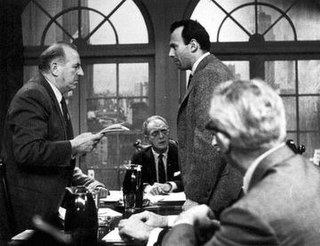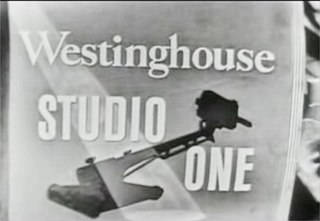Related Research Articles
The year 1958 in television involved some significant events. Below is a list of television-related events during 1958.
The year 1952 in television involved some significant events. Below is a list of television-related events during 1952.
The year 1951 in television involved some significant events. Below is a list of television-related events during 1951.

Oliver Burgess Meredith was an American actor and filmmaker whose career encompassed radio, theater, film, and television.

Imogene Coca was an American comic actress best known for her role opposite Sid Caesar on Your Show of Shows. Starting out in vaudeville as a child acrobat, she studied ballet and pursued a serious career in music and dance, graduating to decades of stage musical revues, cabaret, and summer stock. In her 40s, she began a celebrated career as a comedian on television, starring in six series and guest-starring on successful television programs from the 1940s to the 1990s.

The Daytime Emmy Awards, or Daytime Emmys, are part of the extensive range of Emmy Awards for artistic and technical merit for the American television industry. Bestowed by the New York-based National Academy of Television Arts and Sciences (NATAS), the Daytime Emmys are presented in recognition of excellence in American daytime television programming. The first ceremony was held in 1974, expanding what was originally a prime time-themed Emmy Award. Ceremonies generally are held in May or June.

Edward Leonard O'Neill is an American actor, comedian and former football player. Over his career he has earned four Screen Actors Guild Awards as well as nominations for three Primetime Emmy Awards and two Golden Globe Awards.

Kukla, Fran and Ollie was an early American television show using puppets. It was created for children, but was soon watched by more adults than children. It did not have a script and was entirely ad-libbed. It was broadcast from Chicago between October 13, 1947, and August 30, 1957. Comedienne Fran Allison starred, interacting with puppets, Kukla and Ollie whose puppeteer was the show's creator, Burr Tillstrom. After the original run, the team appeared in other productions over several decades.

The United States Steel Hour is an anthology series which brought hour-long dramas to television from 1953 to 1963. The television series and the radio program that preceded it were both sponsored by the United States Steel Corporation.

Kraft Television Theatre is an American anthology drama television series running from 1947 to 1958. It began May 7, 1947 on NBC, airing at 7:30 p.m. on Wednesday evenings until December of that year. It first promoted MacLaren's Imperial Cheese, which was advertised nowhere else. In January 1948, it moved to 9 p.m. on Wednesdays, continuing in that timeslot until 1958. Initially produced by the J. Walter Thompson advertising agency, the live hour-long series offered television plays with new stories and new characters each week, in addition to adaptations of such classics as A Christmas Carol and Alice in Wonderland. The program was broadcast live from Studio 8-H at 30 Rockefeller Plaza, currently the home of Saturday Night Live.

Studio One is an American anthology drama television series that was adapted from a radio series. It was created in 1947 by Canadian director Fletcher Markle, who came to CBS from the CBC. It premiered on November 7, 1948, and ended on September 29, 1958, with a total of 467 episodes over the course of 10 seasons.

Robert Sterling was an American actor. He was best known for starring in the television series Topper (1953–1955).

The Primetime Emmy Awards, or Primetime Emmys, are part of the extensive range of Emmy Awards for artistic and technical merit for the American television industry. Bestowed by the Academy of Television Arts & Sciences (ATAS), the Primetime Emmys are presented in recognition of excellence in American primetime television programming. The award categories are divided into three classes: the regular Primetime Emmy Awards, the Primetime Creative Arts Emmy Awards to honor technical and other similar behind-the-scenes achievements, and the Primetime Engineering Emmy Awards for recognizing significant contributions to the engineering and technological aspects of television. First given out in 1949, the award was originally referred to as simply the "Emmy Award" until the International Emmy Award and the Daytime Emmy Award were created in the early 1970s to expand the Emmy to other sectors of the television industry.
CBS Daytime is a division within CBS that is responsible for the daytime television block programming on the CBS' late morning and early afternoon schedule. The block has historically encompassed soap operas and game shows, but in recent years has also added UEFA Champions League coverage.

Ford Theatre, spelled Ford Theater for the original radio version and known, in full, as The Ford Television Theatre for the TV version, is a radio and television anthology series broadcast in the United States in the 1940s and 1950s. At various times the television series appeared on all three major television networks, while the radio version was broadcast on two separate networks and on two separate coasts. Ford Theatre was named for its sponsor, the Ford Motor Company, which had an earlier success with its concert music series, The Ford Sunday Evening Hour (1934–42).

The Danny Kaye Show is an American variety show, hosted by the stage and screen star Danny Kaye, which aired on Wednesday nights from September 25, 1963, to June 7, 1967, on the CBS television network. Directed by Robert Scheerer, it premiered in black-and-white. It switched to color broadcasts in the fall of 1965. At the time, Kaye was at the height of his popularity. He starred in a string of successful 1940s and 1950s musical comedy features, made numerous personal appearances at venues such as the London Palladium, and his rare selective visits to the small screen were considered major events. With his recent motion pictures considered disappointments, three triumphant early 1960s television specials led the way to this series. Prior to his film and television career, Kaye had made a name for himself with his own radio show, also titled The Danny Kaye Show. He made numerous guest appearances on other comedy and variety radio shows and headlined in several major Broadway musical revues throughout the 1940s.
Alex Segal was an American television director, television producer, and film director.
The Eternal Light was an American radio and television program on the NBC Radio Network, produced in conjunction with the Jewish Theological Seminary, that was broadcast between 1944 and 1989. Featuring interviews, commentary, and award-winning dramas from the perspective of Judaism, it began on radio in 1944 and continued as a weekly radio program through 1989. A 1946 program, for example, dramatized humanitarian Lillian Wald's founding of New York City's Henry Street Settlement in 1895. The May 31, 1959, program featured a tour of the Holy Land narrated by Ralph Bellamy.

Breaking Point was an American medical drama that aired on ABC from September 16, 1963, to April 27, 1964, with reruns continuing until September 7, 1964. The series, which was a spin-off of Ben Casey, starred Paul Richards and Eduard Franz. The series was created by Meta Rosenberg.
Elmer Albert Heschong was an American art director and production designer, principally for television. In a career that spanned more than 40 years, he worked on over 2,500 productions and was posthumously inducted into the Art Directors Guild Hall of Fame.
References
- 1 2 Brooks, Tim; Marsh, Earle F. (2009). The Complete Directory to Prime Time Network and Cable TV Shows, 1946-Present. Random House Publishing Group. p. 228. ISBN 9780307483201 . Retrieved 2 December 2017.
- ↑ Hawes, William (2001). Live Television Drama, 1946–1951. McFarland. p. 127. ISBN 9781476608495 . Retrieved 2 December 2017.
- ↑ "TV Drama Calendar". Variety. February 6, 1952. p. 30. Retrieved March 29, 2024.
- ↑ Hyatt, Wesley (2006). Emmy Award Winning Nighttime Television Shows, 1948-2004. McFarland. p. 24. ISBN 9780786423293 . Retrieved 2 December 2017.
- ↑ "("Celanese Theatre" search results)". Emmys. Television Academy. Archived from the original on 2 December 2017. Retrieved 2 December 2017.
- ↑ "Celanese Theatre". Peabody. Grady College of Journalism and Mass Communication. Archived from the original on 2 December 2017. Retrieved 2 December 2017.
- ↑ Bass, Milton R. (August 12, 1952). "The Lively Arts". The Berkshire Evening Eagle. Massachusetts, Pittsfield. p. 8. Retrieved December 1, 2017– via Newspapers.com.
